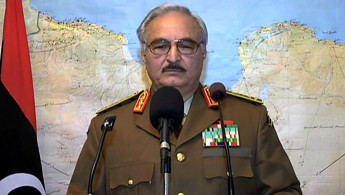Libya's General Khalifa Haftar accused of war crimes
The spokesperson for Libya's General Khalifa Haftar has accused his former boss of war crimes and corruption, days after the formation of a unity government.
2 min read
Haftar has led troops against Islamist militias in Benghazi [Getty]
The spokesman for Libyan General Khalifa Haftar launched a scathing tirade against the controversial army chief on Friday, accusing him of corruption and a long list of war crimes, The New Arab's Arabic service has reported.
Colonel Mohammad Hejazi made the accusations on a local television station alleging that Haftar has prolonged Libya's war, targeted civilians and his opponents with a secret paramilitary force, and involved in corruption.
"[Haftar] set up a civilian cadre to carry out abductions and killings. Have you ever heard of military officers beheading people when they are taken into custody? Us ground commanders have nothing to do with the crimes of Haftar's mafia," Hejazi said.
"Haftar does not care about the suffering of displaced people and has deliberately drawn out the war, which he knows nothing about and is not in control of," the spokesman for Haftar's Operation Dignity said.
He accused Haftar of embezzling funds from the Libyan army to buy property in Egypt and Jordan.
"We supported him because we thought he wanted to set up a military institution. We got rid of Gaddafi and we can do it again with Haftar and his criminal associates," Hejazi added.
The head of the Libyan air force has said that none of Hejazi's allegations were "remotely true", according to local media.
An arrest warrant for Hejazi is expected to be issued imminently.
In March, the internationally-recognised government appointed Haftar as head of the military.
He was previously considered a renegade and had set up a powerful paramilitary force, including former officers of Gaddafi's army, determined to eradicate "terrorism".
A Libyan unity government was formed on Tuesday under a UN-brokered deal aimed at ending years of bloodshed, but it was unclear whether the leaders have wide support from the warring sides.
World powers are appealing to the country's rival parliaments to back the new administration to break political paralysis that has provided fertile ground for Islamist militants and people-smugglers.
But less than half of the members of the two parliaments signed up to the UN-sponsored agreement last month.
The unity government headed by Fayez al-Sarraj - named prime minister-designate under the UN-sponsored accord - comprises 32 ministers, the administration announced.
Libya has been in chaos since the 2011 ousting of long-time dictator Muammar Gaddafi.
A militia alliance including Islamists overran Tripoli in August 2014, establishing its own government and parliament and causing the internationally recognised administration to flee to the country's remote east.
The chaos has allowed the Islamic State group to grow in Libya, and there are fears in Europe and North Africa of extremists using Sirte as a base for attacks on neighbouring countries.
Colonel Mohammad Hejazi made the accusations on a local television station alleging that Haftar has prolonged Libya's war, targeted civilians and his opponents with a secret paramilitary force, and involved in corruption.
"[Haftar] set up a civilian cadre to carry out abductions and killings. Have you ever heard of military officers beheading people when they are taken into custody? Us ground commanders have nothing to do with the crimes of Haftar's mafia," Hejazi said.
"Haftar does not care about the suffering of displaced people and has deliberately drawn out the war, which he knows nothing about and is not in control of," the spokesman for Haftar's Operation Dignity said.
He accused Haftar of embezzling funds from the Libyan army to buy property in Egypt and Jordan.
"We supported him because we thought he wanted to set up a military institution. We got rid of Gaddafi and we can do it again with Haftar and his criminal associates," Hejazi added.
The head of the Libyan air force has said that none of Hejazi's allegations were "remotely true", according to local media.
An arrest warrant for Hejazi is expected to be issued imminently.
In March, the internationally-recognised government appointed Haftar as head of the military.
He was previously considered a renegade and had set up a powerful paramilitary force, including former officers of Gaddafi's army, determined to eradicate "terrorism".
A Libyan unity government was formed on Tuesday under a UN-brokered deal aimed at ending years of bloodshed, but it was unclear whether the leaders have wide support from the warring sides.
World powers are appealing to the country's rival parliaments to back the new administration to break political paralysis that has provided fertile ground for Islamist militants and people-smugglers.
But less than half of the members of the two parliaments signed up to the UN-sponsored agreement last month.
The unity government headed by Fayez al-Sarraj - named prime minister-designate under the UN-sponsored accord - comprises 32 ministers, the administration announced.
Libya has been in chaos since the 2011 ousting of long-time dictator Muammar Gaddafi.
A militia alliance including Islamists overran Tripoli in August 2014, establishing its own government and parliament and causing the internationally recognised administration to flee to the country's remote east.
The chaos has allowed the Islamic State group to grow in Libya, and there are fears in Europe and North Africa of extremists using Sirte as a base for attacks on neighbouring countries.





 Follow the Middle East's top stories in English at The New Arab on Google News
Follow the Middle East's top stories in English at The New Arab on Google News
![Israeli forces ordered bombed Gaza's Jabalia, ordering residents to leave [Getty]](/sites/default/files/styles/image_330x185/public/2176418030.jpeg?h=a5f2f23a&itok=_YGZaP1z)

